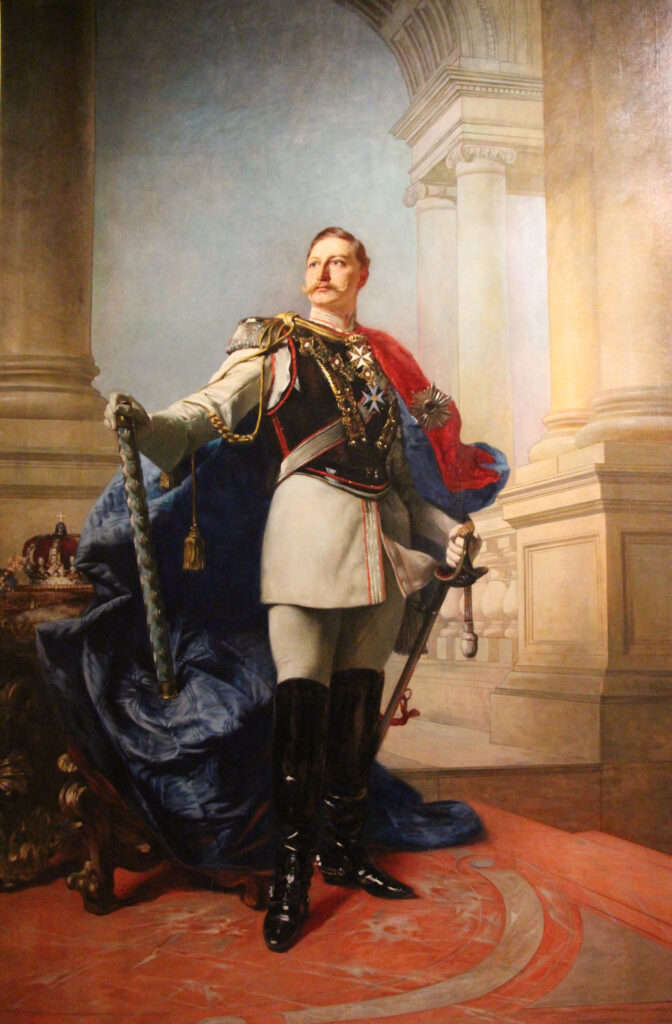
Kaiser Wilhelm II, portrait by Max Koner, credit Wikipedia
The Kaiserreich’s Militant Tendency
Werner Sombart, Traders and Heroes; Patriotic Reflections, translated with a forward by Alexander Jacob, Arktos, London 2021, 115pp, reviewed by Leslie Jones
The sociologist and economic historian Werner Sombart (1863-1941), a former student of Gustav von Schmoller, was Professor of Economics at Breslau, then at Berlin. During the earlier stages of his career, “der rote Professor” and historian of socialism was profoundly influenced by Marxism and upheld the progressive role of the English trade unions under ‘late capitalism’. But as Vitantorio Gioia observes [i], around 1911 there was a marked turn in Sombart’s thinking, an epistemological gap, signalled by the publication of The Jews and Modern Capitalism. The latter study constitutes both a critique of historical materialism and a riposte to Max Weber’s The Protestant Ethic and the Spirit of Capitalism (1904-5).
Sombart believed that without the input of the Jews, the development of capitalism would not have been possible, for they had “given certain aspects of economic life the specific features they bear”. The Jews had substituted “economic rationalism for time-honoured tradition”, pursuing business for its own sake and recognising “the supremacy of gain” over any other factor. [ii] Now that he regarded the acquisitive spirit as immoral and destructive, Sombart viewed the medieval guilds in a favourable light. And he regretted the declining significance of Christianity which had once been a counter-weight to the commercial spirit. As for the goals of the English trade unions, these were now dismissed as “nothing more than capitalism or commercialism with inverse insignia’, since their members put comfort before all else.
Traders and Heroes; Patriotic Reflections (1915) self-evidently belongs to this second, culturally pessimistic phase of Sombart’s thinking. It is dedicated to the “young heroes, out there facing the enemy”. German nationalism and veneration for the state are treated therein as an antidote to the rampant commercial spirit espoused by England. “All Great Wars”, Sombart opines, “are religious Wars”. Ideals rather than economic interests drove German statecraft, in his estimation.
Herbert Spencer, for Sombart, epitomised what he disparagingly called the English ‘trader’s mentality’ and the “superficial trader’s conception of the state”. Spencer’s sociology hinges on his dichotomy between two ideal types, the ‘industrial’ and the ‘militant’ type of society. The former is based on ‘self-ownership’. The latter is characterised by the ascendancy of the state, coercive rule and imperialism. For this product of provincial dissent, the England of 1850 was the acme of individual freedom, when men could work, move and trade freely. Spencer regarded a residual state, or ‘joint stock protection society’, as the goal of social evolution, to be brought about by natural selection and use-inheritance. A bastion of the Ratepayer’s Defence League, he considered education and road-making as outside the proper sphere of government.[iii]
Sombart, a great admirer of Nietzsche, acknowledged that critics of so-called German barbarism and militarism, paradoxically, were partly right, for war is “the greatest moral force that is employed by providence to preserve man…from dissipation and indolence”. Materialism, or ‘comfortism’, conversely, were destructive of ‘true culture’, turning a nation into an ant hill or “a heap of living corpses”.
In his perceptive forward to Traders and Heroes (Händler und Helden), Alexander Jacob contends that “the British trader’s worldview …continues to rule the world today”. Maybe so, but Sombart overstated his case in this piece of wartime propaganda. When Spencer’s Principles of Sociology vol 3 was published in 1896, he was already a passé figure, as the vogue for such diverse supporters of the state as T.H. Green, William Morris and Ruskin indicated. Indeed, their rejection of materialism and eudaemonism had been anticipated by Thomas Carlyle. [iv] In the 1890’s, Spencer himself detected a pronounced reversion to the ‘militant’ order, as evidenced by imperialism, arms races and the accompanying jingoism. To view this return of coercive rule as confirmation of a law of rhythm, manifested in all things, provided Spencer with but little comfort.
ENDNOTES
[i] Prof Vitantonio Gioia, University of Salento, ‘Werner Sombart and “Modern Capitalism”, a Working Hypothesis’
[ii] Werner Sombart, The Jews and Modern Capitalism, 1911, translated by M Epstein, Batoche Books, Kitchener, 2001
[iii] Leslie Jones, ‘A Social Theorist in the Age of Imperialism; the Life and Thought of Benjamin Kidd, 1858-1916′, PhD thesis, LSE, 1984
[iv] Sombart did not consider Carlyle “an English mind” since “from early on he absorbed only German intellectual food”. N.B. Carlyle was a Scot

Soldiers from the 4th Division near Chateau Wood, Ypres, in 1917











“Who whom?” (Trotsky).
Does the Government rule the Bankers or do the Bankers rule the Government?
The Internet Archive has an English translation of Sombart’s “A New Philosophy” (1937).
Following an article in the “New Statesman” about culture war and liberal democracy, I submitted a letter pointing out that our current crisis has arisen from several causes, including voter impotence, but a perennial factor is the reliance of parties and therefore parliament on financial interests and donations.
“Long exposed by different ‘outliers’ – anarchist (Pierre-Joseph Proudhon, Mikhail Bakunin), communist (Karl Marx, Vladimir Lenin), fascist (Robert Michels, Oswald Mosley) – this basic defect escapes repair, in an era of climate change, mass migration, WMD proliferation and artificial intelligence.” If we cannot get this issue properly raised in the leftwing weekly, maybe it could be discussed here.
I see that THE NEW STATESMAN did not include Ashton’s letter in its correspondence, though of course a selection is necessary with two pages that are not quite as banal however as their counterpart in THE SPECTATOR nor as tedious as the woke-leftist monomania in THE GUARDIAN.
However, the valid, thoughtful and important point Ashton was making unfortunately coincided with the “liberal” weekly’s “new look” launch to plans for on-going “internationalisation” led by Jeremy Cliffe, ECONOMIST’s Brussels top bureaucrat, “bolstered” by Alix Kroeger from the BBC and Tim Ross from Bloomberg. “As well as creating commercial partnerships” and an “extended network of brands”, it will use the latest technology to analyse its potential audience and the engagement of “our communities” to develop “new ways” of “funding” expansion.
Three whole pages are devoted to its major collaborator Hexaware [sic] where “tech and digital”, automation and artificial intelligence, are shaping “companies’ ambitions” so they can “operate and grow” in the new era of “thought leadership” for “business people” or simply “citizens of this planet”, explained by Amrinder Singh and appropriately illustrated by a Black man tapping on a computer keyboard inside, plus two more Persons of Color on the back cover.
Other full-page adverts include Higginson (“corporate communications”), Facebook (“global partnerships”), Jupiter Asset Management (“sustainable equites”), Aberdeen Standard (Investment Trust), British Museum (supported by “multinational oil & gas”), Sophos (“cyber security”), Christopher Ward’s $1,095 watch & Johnson Matthey (£15 billion revenue).
George Bernard Shaw, Keir Hardie and William Morris RIP. “Arise, O England….” thy day has yet to come!
Thank you, H.F.
Point taken.
With big money and big cyber in control, we are all up against it. Quis custodiet? Circumspice!
If only TQR had similar resources and readers.
Sed, nil desperandum. Spes est!
(Advice from Dead White European Males)
The penny is dropping.
See e.g. Peter (“I am not antisemitic”) Oborne, Opinion, “The Guardian”, 6 October 2021.
The Parliamentary Party is a mechanism whereby career politicians seek to please donors and then con the electorate at intervals.
Boris is the Great Entertainer who keeps us cheerful through past failures, present crises and future bluff. A comedian’s version of Stalin 86 years ago: “Life is getting better every day, comrades.”
Don’t forget (1) the new fundraisers for post-Corbyn Starmer, almost B-Liar deja vu; and (2) Bride of Frankenjohnson.
Re (2) Carrie (“Let them eat woke”) Antoinette tells the Stonewall boys, girls, neithers & both, at the “Tory Conference”, that still more must be done to satisfy the LGBTQIABDSM++ lobby. A few suggestions: (i) a homosexual TV presenter, (ii) male x male dancers doing the Tango (carefully revised to avoid audience laughter), (iii) gay vicar in a soap, (iv) a lesbian teenage affair in a soap, (v) same-sex naked dating on TV, (vi) regular same-sex blind dates in the “right-wing” Daily Mail, (vii) criminalisation of voluntary religious orientation conversion, combined with the legalisation of gender-change treatment of minors,….and eventually (viii) an all gay Take Me Out on TV, (ix) a Disabled Lesbian Love Island programme, (x) education booklets for school pupils – “Buggery for Boys”, “Lesbian Sex Work as a Career”, “Chickens Meet New Daddies” – Instructive Videos supplied (actually not far off already). Plus the arrest of people who disagree as “hate criminals”.